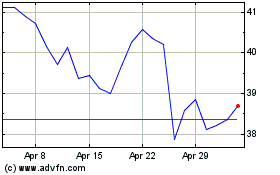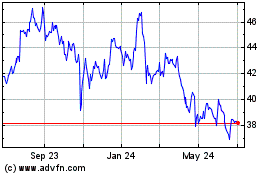CMO Today: DOJ Probing Comcast's Local Ad Sales Practices
November 25 2015 - 7:38AM
Dow Jones News
By Mike Shields
SPOT JUSTICE: Does Comcast throw its weight around so much in
the local cable ad sales world that it's not fair to everybody
else? That's a question the U.S. Justice Department is looking
into, based on a document known as a civil investigative demand
that was obtained by The Wall Street Journal. That document says
the feds are looking into whether Comcast has created
"monopolization or attempted monopolization" in areas where the
company has a big local ad footprint. Wait, isn't cable inherently
local in a way that no provider can really mess with another
company's territory? And why does the government care anyhow? Well,
the government was clearly concerned about how much Comcast could
potentially dominate this obscure $5 billion ad market when it was
exploring a merger with Time Warner--which ultimately never
happened. And Comcast doesn't just influence local ad sales in its
markets; it also manages "interconnects"--ad sales cooperatives
made up of multiple pay TV providers--in 26 of the top 50 TV
markets in the country. So it's already more powerful than you
might think. The big question is, what does the Justice Department
think it's doing with that power?
MAYER REPORT CARD: On Monday, following a string of recent hits,
Yahoo took another body blow, as WSJ published an extensive story
on how insiders believe Chief Executive Marissa Mayer has misled
people on the company's user--and financial--growth. Yesterday,
WSJ's Digits dug a little deeper, holding Ms. Mayer's own
statements up for their own reality check. And the pattern isn't
good, as Ms. Mayer has made more than her fair share of
declarations about where Yahoo's business is headed that haven't
come to fruition. For example, over the past three years Ms. Mayer
has said that Yahoo's display business would grow faster than the
general market (not even close) and build Yahoo Screen into a major
Web video destination (again, not even close). While there's not
necessarily a new revelation here, all of this adds to the
perception that Ms. Mayer's leadership has been erratic and her
results have been subpar. That will only make it harder for her to
try anything else bold going forward--even if that's what the
company needs.
ATTENTION SHOPPERS: Retailers have long hoped that they could
track how digital advertising impacts real-world sales. But even
with the data online advertising provides, that's never been easy.
This year, just in time for Black Friday, Google is introducing
some new ad targeting tools that gets this brick-and-mortar
businesses one step closer, reports Recode. Specifically, using
data from mobile searches and apps like Google Maps, Google says it
can provide data that will help retailers gauge how people are
searching for products while in stores at a given time this holiday
season, and tweak their ad targeting and spending accordingly. This
will surely anger the privacy police--and probably delight shoppers
on the hunt for that hard to find BB-8 droid toy.
EVERYONE GETS AN AD BLOCKER! The topic of ad blocking makes many
Web publishers and ad buyers cringe, and many are quietly hoping
the topic will go away soon. So why would a top digital ad
executive encourage a bunch of industry colleagues to install ad
blockers, unless he wanted to commit career suicide? Well, Joe
Marchese, president of advanced advertising products at Fox
Networks Group, actually thinks that widespread ad blocking would
help him and lots of other folks at top media companies long-term,
as he writes in a post for CMO Today. Mr. Marchese's provocative
theory is that if everybody had ad blockers, yes, there's be some
short-term pain, but it would clear out all the lousy,
low-performing schlocky Web ads, not to mention all the fraud, and
force advertisers and publishers to focus on quality--which would
naturally be good for the Foxes of the world. Of course, this
scenario is mostly fantasy--until it isn't. Ad blocking is much
bigger in Europe, so it's not out of the question that it could
swell here. Mr. Marchese's overall point seems to be that digital
advertising needs a major overhaul, which most traditional and even
digital publishers--especially those selling banner ads for
pennies--would tend to agree with.
Elsewhere
The Federal Communications Commission has hired noted digital
security expert Jonathan Mayer as the chief technologist in the
agency's enforcement bureau [ New York Times]
Amazon is pulling its controversial Nazi-themed ads--tied to the
new series "The Man in the High Castle" from New York City subways
[ Variety]
Consumer advocacy groups have filed complaints with the Federal
Trade Commission over some of the ads on YouTube's new kids app [
TechCrunch]
More than 60% of online advertisers say they will move money out
of digital outlets that don't offer third-party measurement,
according to a new survey from the Association of National
Advertisers [ The Drum]
Shorter episodes of "Sesame Street" will land on HBO in January
[ CMO Today]
A programming shakeup is in the offing at HLN as the network's
top programming executive departs [ CMO Today]
Some retailers are seeing sizable portions of their traffic come
from Pinterest [ CMO Today]
The German media giant Axel Springer is taking an ad-blocking
company to court [ TechCrunch]
About Us
Follow us on Twitter: @wsjCMO, @digitalshields, @VranicaWSJ,
@JackMarshall, @nftadena, @perlberg, @srabil, @asharma
Subscribe to our morning newsletter, delivered straight to your
inbox, at http://on.wsj.com/CMOTodaySignup.
Write to Mike Shields at mike.shields@wsj.com
Subscribe to WSJ: http://online.wsj.com?mod=djnwires
(END) Dow Jones Newswires
November 25, 2015 07:23 ET (12:23 GMT)
Copyright (c) 2015 Dow Jones & Company, Inc.
Comcast (NASDAQ:CMCSA)
Historical Stock Chart
From Mar 2024 to Apr 2024

Comcast (NASDAQ:CMCSA)
Historical Stock Chart
From Apr 2023 to Apr 2024
